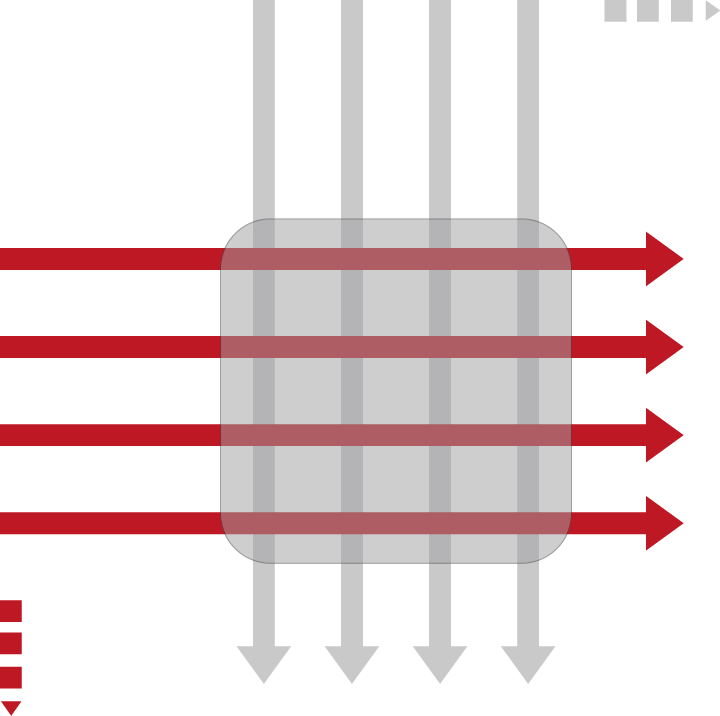Glossary
Logout
©Copyright Arcturus 2022, All Rights Reserved.
7
Terms & Conditions
|
|
|
|
Security & Privacy
Contact
PRODUCT MANAGER/OWNER
|The Product Management Framework and the Product Manager in Context
Product Management is a key business discipline, the purpose of which is to deliver 'Strategic Intent' (the Company objectives) efficiently, effectively, consistently and in a timely manner achieved by managing / aligning the Company abilities to deliver customer delight profitably.
The Product Management discipline is itself made up of three 'sub-disciplines' (activities), entitled 'Programme Management', 'Market Development' and 'Strategic Portfolio Management'. By definition, this is 'true' Product Management, as the framework pragmatically covers every aspect of the management activity across defined markets / segments thereof. The framework is eminently flexible so it can be expanded and adapted to meet the needs of any business application.
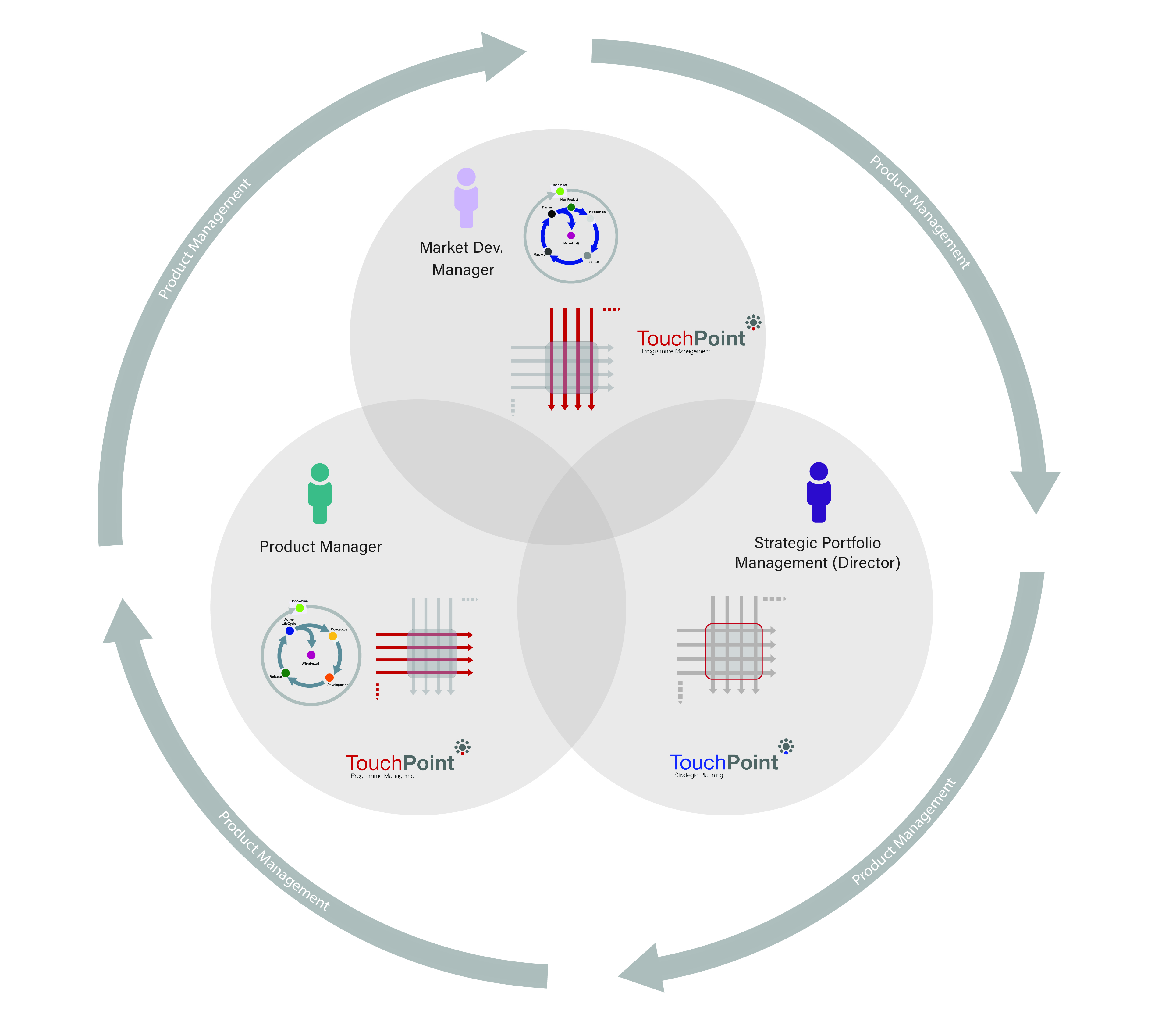
Product Management Framework

Multi-disciplinary Team Management
Product Management - Defined
It is vitally important that all three activities (Programme Management, Market Development and Strategic Portfolio Management) work in complete harmony with one another and with one purpose, to deliver 'Strategic Intent' efficiently and effectively - in other words it must be right for your business - and as with other processes and activities, it must deliver measurable value.
In common with other 'disciplines', which are not a 'direct' or 'functional' activity within the business unit, if a specific product management activity is deficient in some way or another, functional areas of the business unit will automatically step up to the plate and make this activity happen based upon their own level of understanding of what is required (which may, or may not be in alignment with Strategic Intent) - so it's rather like the orchestra playing without a conductor at this point, they can, because in this example, every member of the orchestra is a qualified musician, but the end result has many disadvantages, least of all is that it doesn’t sound quite right! - ...and yes this example has been proven.
So in essence the functional areas of the business unit, will inevitably deliver Products and Services regardless of whether there is a Product Manager or not, but this ad-hoc process will certainly not be as robust or as efficient as a PM driven activity . Please note that this observation should not be practiced as a position of choice and should not be encouraged.
The diagram below (1 -4) detail the primary alignments associated with Product Management - fundamentally the framework remains (...this is always fixed and does not change) but the core responsibilities change according to business needs and those responsible for the Product Management activity. As such the Product Manager (in title) does not necessarily own or is responsible for the entire Product Management activity. There are a number of reasons for this, not least is, by the time the portfolio Vs the target market reaches a certain size, logistically it becomes to much work and just too complex for one person to handle. The 'Product Manager' is however, as a minimum, responsible for the 'Programme Management' activity - in other words delivering required Products to the matrix but of course there can be more than one Product Manager (in-fact this can be as many as is required).
The following defined variations are 'primary' variants of Product Management activities (alignments) :
1. Product Manager (Programme Management) + Market Development Alignment
2. Market Development Alignment
3. Product Manager Alignment
4. Entrepreneurial (Start-up) Alignment

1
2
3
4

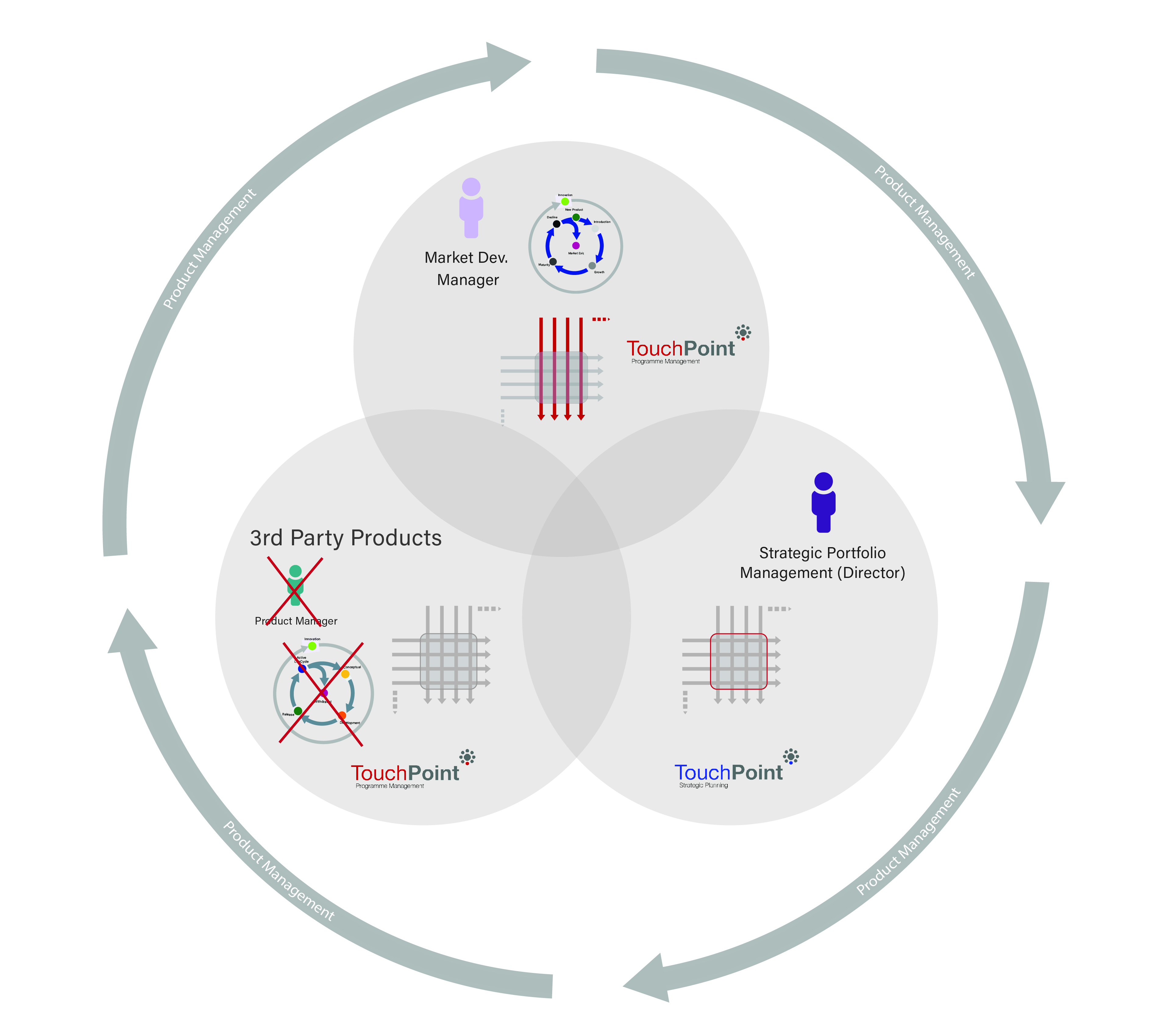
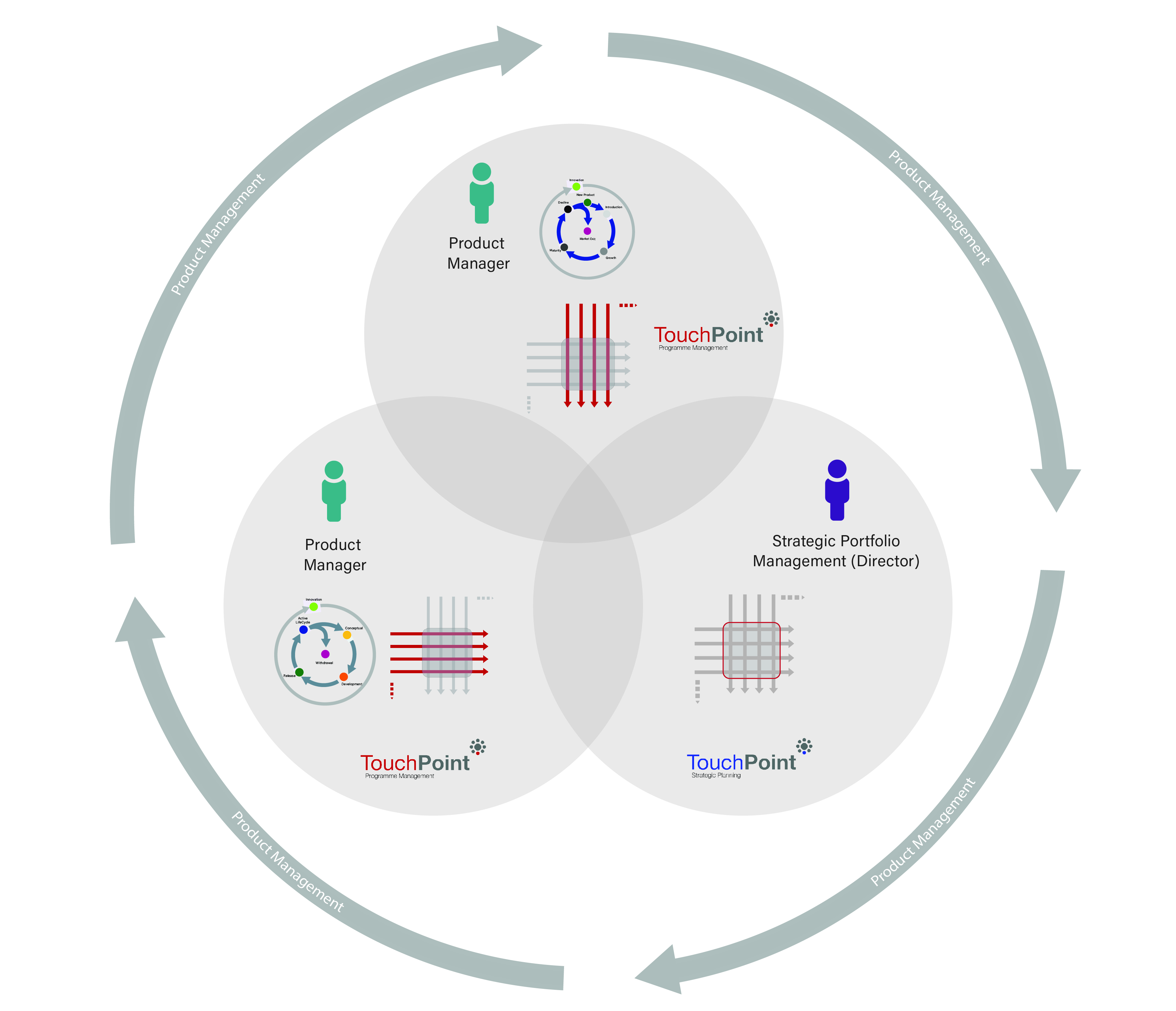
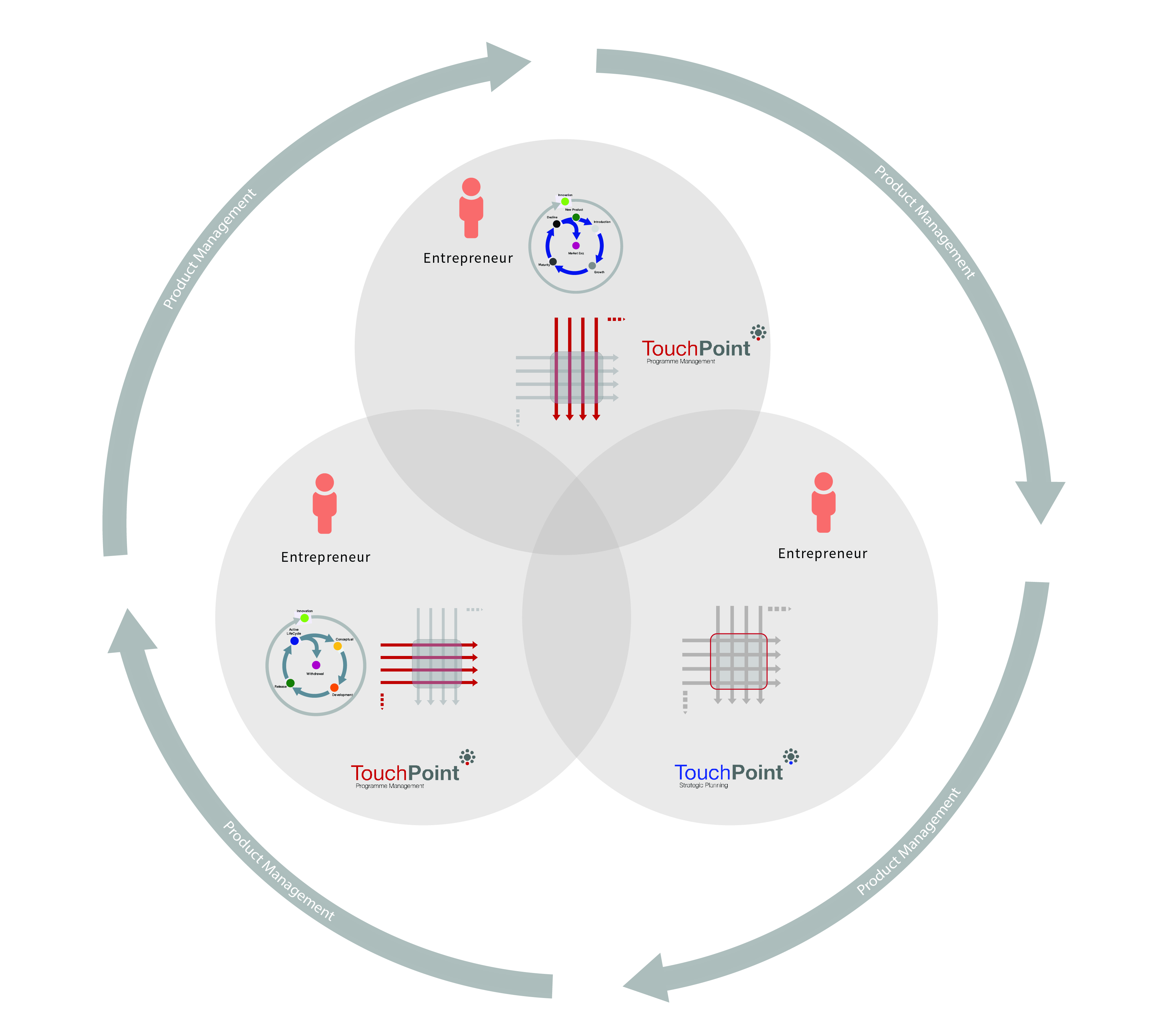
Click to Zoom
Product Management is a key business discipline, the purpose of which is to deliver 'Strategic Intent' (the Company objectives) efficiently, effectively, consistently and in a timely manner achieved by managing / aligning the Company abilities to deliver customer delight profitably. This is a key activity of the Product Manager.
The Product Management discipline is itself made up of three 'sub-disciplines' (activities), entitled 'Programme Management', 'Market Development' and 'Strategic Portfolio Management'. By definition, this is 'true' Product Management, as the framework pragmatically covers every aspect of the management activity across defined markets / segments thereof. The framework is eminently flexible so it can be expanded and adapted to meet the needs of any business application.
Businesses are culturally complex, so particular attention should be given to how your business objectives / strategies are cascaded into the organisation and the use of multidisciplinary teams to get things done, this is often a weak area in many companies and will have profound effect on the outcomes. Changing the 'culture' of a steadfast business steeped in tradition should however, not be underestimated, it will take careful rational to change its course for the better. In practice, to realise the true benefits of what best practice Product Management has to offer requires a competitive organisation and absolute clarity as to the roles and responsibilities of those within the business environment.
Despite a phenomenal increase in the PM business role, the actual job description of the Product Manager within the business unit remains quite nebulous and varies quite considerably from company to company. Furthermore, outside influences like the popularity of the 'Agile' development process has noted helped this situation by introducing roles for, the 'Product Manager' and 'Product Owner'. The problem with these new definitions is, they are from a Development process perspective, but not necessarily from a business perspective. This can, ultimately lead to a rather confused short term bias and product ownership which is not particularly helpful. Furthermore and to compound this situation, many companies have a convoluted alignment when it comes to Market Development, with Sales often let loose to do their own thing regardless of any prior strategic planning activity. The answer of course is to adopt a suitable product management framework like the PMM as described here.
As mentioned above, there has been a steady increase in the adoption of ‘Agile’ development processes to complement the more traditional 'Waterfall / Stage-Gate' processes (primarily in software based products) - but it should be noted however that the Agile process does not simply replace Stage-Gate as a development process, rather it can be seen as both an alternative and/or complementary process. Hence the term hybrid development process, which is combination process. The main reason for mentioning development processes at this point is that the Product Manager has responsibilities in virtually every development process, so PM's must manage their time spent in these processes wisely otherwise development processes will be all consuming and other parts of the PM activity will undoubtedly suffer.
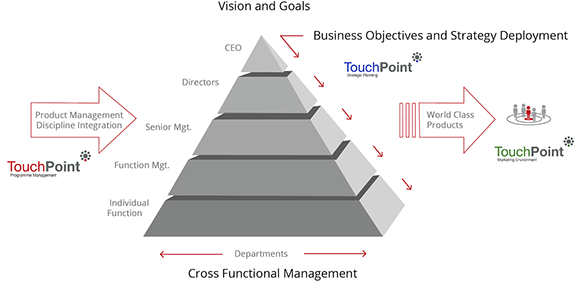
The Role of the Product Manager
Product Management can be described as a business ‘discipline’ (an ethos) that has to be embedded within the organisation. Many parallels can be drawn from ‘marketing’ and ‘quality assurance principles’, whereby the discipline itself is the underlying work principle and not a ‘function’ as such. Taking this into account the role of the Product Manager is to manage the ‘Voice of the Customer’ throughout the organisation with the objective of optimising the company’s capabilities and resources ahead of the competition.
Commercial success of the product is the ultimate goal of the Product Manager and realising this goal will require co-ordinated support from the functional areas of the company. Cross functional process management and an attitude of "making it happen" are key attributes for success in product management. Product Managers also need to understand and appreciate the impact of their decisions and actions will have on the functional areas of the company. This in turn will require truly competent and strong individuals with a balance of core competence skills and commitment.
The Product Manager must be seen as an expert in their field and respected for having a thorough understanding of the interactions of all functional areas of the company. It is important to note that full recognition and perceived ‘status’ has to be duly earned by the Product Manager themselves, however certain prerequisites should include clear terms of reference and budgetary responsibility wherever possible.
Product Management is an activity of ‘product’ ownership from Product Conception to Product Withdrawal. It is without any doubt an essential business discipline whereby the Product Manager is analogous to the conductor of an orchestra - without the conductor, uncontrolled pandemonium sets in with each instrument fighting to be heard in continuous cycle of disarray’. Cross functional process management and an attitude of "making it happen" are key attributes of the Product Manager. Fundamentally the Product Manager must also have both authority and status to carry out the function in the first instance, otherwise he / she will assume the role of a co-ordinator and be completely bypassed when important decisions are needed and required, which is certainly not a desirable outcome.
The Product Management process ensures that sufficient attention is devoted to the Planning , Development and Marketing of each product within the portfolio. A Product Manager’s function is one of liaison between the various functional departments of the company to ensure optimum co-ordination of their activities and hence maximise their particular product's contribution to over-all profitability. The ability of the Product Manager to enlist support from the functional disciplines within the organisation is a key success factor.
It is important that the product management activity operates within the boundaries laid down in the company Strategic Plan and as such is an integral part of the marketing function. A key objective of a Product Manager is therefore to plan and specify a product / product portfolio in line with the long term strategic plan - whereby Business Plans are a fundamental part of this process. Proposed products must provide good synergy within the overall product portfolio i.e. product variants must be planned in accordance to meet market needs (Time to market) and within the scope and capabilities of the company.
|Key Product Manager Activities
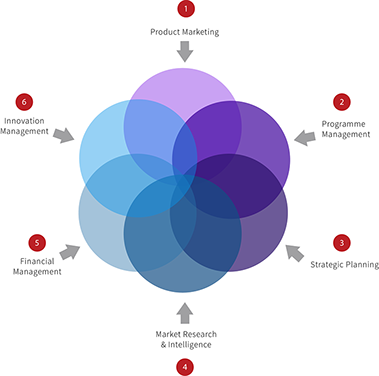
The Product progressively moves through the 6 Phases of Product Management (detailed under the PMM Methodology framework)
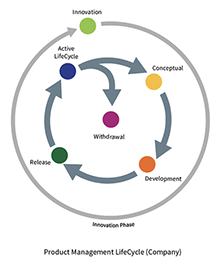
The Product Manager has 6 'primary' subject activities in their domain. This model is perpetual and any bias changes depending on where the Product is in its Life-Cycle.
1. Product Marketing
2. Programme Management
3. Strategic Planning
4. Market Research & Intelligence
5. Financial Management
6. Innovation Management
The following is a selection of (highlights) activities performed by the PM - please note: this list is not exhaustive, for more detailed activities see PM frameworks section for more detailed information.
- Continuously monitor market needs and requirements, taking into account future technology / developments, competitor products/services and the changing requirements of regulatory bodies.
- Produce and own the Product Business Plan.
- Strategically manage and own the product / product portfolio from conception to product withdrawal.
- Define and create application packages that bring together products from more than one product portfolio and provide innovative customer solutions.
- Manage the product creation process by chairing multi disciplinary business teams. The emphasis of this activity is to chair the product business team and not to facilitate in problem solving at this meeting. The product business team will meet regularly to review all business goals / objectives taking corrective action wherever and whenever possible.
- Provide sales support material i.e. develop and produce training material (Audio visual presentations, product ordering procedures, technical data sheets, handbooks etc.)
- Plan, organise and participate in product product release presentations - both internal and external to the company.
- Monitor and control product development budgets.
- Produce technology Road Maps for the product / product portfolio.
- Develop and maintain pricing policies for the product.
- Develop and monitor critical success factors for the product in line with the product business plan.
- Plan and manage the product release.
- Develop the after sales support policy for the product - Service philosophy, Spares listing, recommended test equipment, maintenance programmes etc.
To successfully carry out the product management function a Product Manager must be given the appropriate responsibilities, accountabilities and command the…
- Appropriate Knowledge and Understanding
- Authority to make decisions
- Command respect from his / her peers
In addition to the above the Product Manager will achieve their own objectives by duteous helpings of interpersonal skills, influence and persuasion.
Arcturus7 architecture & content : Steve Heron, IPM







